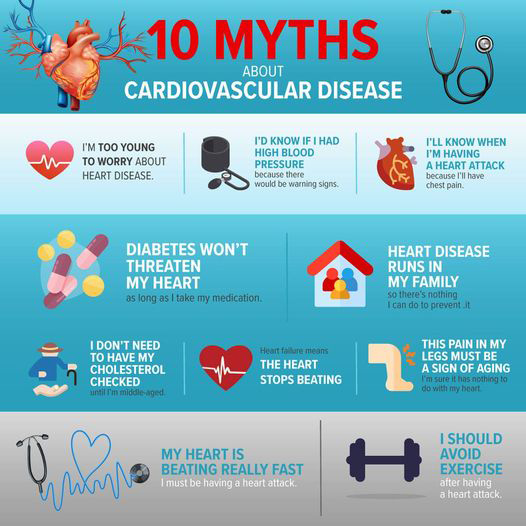Introduction:
February celebrates Heart Health Month. Heart health is a crucial aspect of overall well-being, yet there are numerous myths and misconceptions surrounding it. In this comprehensive article, we will debunk some of the most common myths about heart health, shedding light on the truth behind these misconceptions.
Dr. Martha Grogan, a respected cardiologist at Mayo Clinic, emphasizes the significance of understanding the truth about heart health. She states, “Understanding the truth about heart health is pivotal. Many myths can lead to complacency or unnecessary anxiety. By focusing on evidence-based information and adopting a comprehensive approach to heart care, individuals can make informed decisions that contribute to a healthier heart and a better quality of life.”

Myth 1: “Heart disease only affects older adults.”
Contrary to the myth that heart disease is exclusive to the elderly, it can affect people of all ages. While the risk increases with age, lifestyle factors such as poor diet, lack of exercise, and stress can contribute to heart issues in younger individuals. Dr. Grogan underscores the importance of adopting heart-healthy habits at all ages to prevent and manage heart disease effectively.
Harvard Health Publishing adds to this perspective, noting that regardless of age, a commitment to a heart-healthy lifestyle is essential. “Simple changes, such as adopting a heart-healthy diet, engaging in regular physical activity, and managing stress, can significantly reduce the risk of heart disease,” they advise.
Myth 2: “Cholesterol is always bad for your heart.”
Cholesterol is often misunderstood, with many people associating it solely with heart disease. However, not all cholesterol is harmful. High-density lipoprotein (HDL) cholesterol is considered good for the heart, as it helps remove other forms of cholesterol from the bloodstream. It’s the balance between HDL and low-density lipoprotein (LDL) cholesterol that matters. Maintaining a healthy balance is crucial for heart health.
Harvard Health Publishing emphasizes the impact of lifestyle choices on heart health, stating, “Lifestyle choices have a profound impact on heart health. Simple changes, such as adopting a heart-healthy diet, engaging in regular physical activity, and managing stress, can significantly reduce the risk of heart disease. It’s crucial to empower individuals with accurate information to make informed choices for a heart-healthy life.”
Myth 3: “I’m physically fit, so I don’t need to worry about heart health.”
While regular exercise is essential for heart health, maintaining physical fitness does not provide absolute immunity from heart issues. Elements such as genetics, diet, and stress also contribute significantly. Even athletes may experience heart problems, underscoring the necessity of a holistic approach to heart health that encompasses a balanced diet, stress management, and regular check-ups.
Harvard Health Publishing emphasizes this point, asserting that physical fitness alone does not serve as a foolproof defense against heart problems. According to their guidance, a comprehensive approach to heart health involving a balanced diet, stress management, and regular check-ups is vital for preventing heart issues, irrespective of one’s fitness levels.
Myth 4: “Heart disease doesn’t affect women as much as men.”
Contrary to popular belief, heart disease is a leading cause of death in women. The symptoms of heart disease can manifest differently in women compared to men, leading to underdiagnosis. Women may experience subtler symptoms or those unrelated to chest pain, such as fatigue, shortness of breath, or nausea. Recognizing these differences is crucial for timely intervention and prevention.
Mayo Clinic’s Dr. Martha Grogan supports this perspective, stating, “It’s essential to recognize that heart disease is a significant threat to women’s health. Understanding and addressing the unique symptoms in women is vital for early detection and effective management.”
Harvard Health Publishing adds, “By retirement age, 70% of men and women have cardiovascular disease, which includes coronary artery disease, heart failure, stroke, and hypertension. Risk continues to rise, and by age 80, 83% of men and an even higher percentage of women—87%—are affected.”
Myth 5: “Heart problems run in my family, so there’s nothing I can do about it.”
While a family history of heart disease does increase your risk, it doesn’t mean you’re destined to develop heart issues. Lifestyle choices significantly influence heart health. Adopting a heart-healthy diet, exercising regularly, avoiding tobacco, and managing stress can mitigate genetic predispositions. Regular check-ups and early detection also play a crucial role in preventive care.
Harvard Health Publishing concurs, emphasizing the power of lifestyle choices in mitigating genetic risks. “A proactive approach, including a heart-healthy diet and regular check-ups, can significantly reduce the impact of genetic predispositions to heart disease,” they note.
Myth 6: “I don’t need to worry about heart health until I experience symptoms.”
Heart disease often develops silently, with symptoms appearing late in the progression of the condition. Waiting for symptoms to manifest can be dangerous, as irreversible damage may already be underway. Regular health check-ups, cholesterol screenings, and blood pressure monitoring are essential for early detection and intervention, even in the absence of noticeable symptoms.
Mayo Clinic’s Dr. Martha Grogan reinforces the importance of proactive care, stating, “Waiting for symptoms is risky when it comes to heart health. Regular check-ups and screenings are crucial for early detection and intervention, leading to better outcomes.”
Myth 7: “If you have heart disease, you need to take it easy.”
A common misconception surrounding heart health is the belief that individuals diagnosed with heart disease should lead a sedentary or overly cautious lifestyle. However, this myth contradicts the advice provided by medical professionals.
Dr. Martha Grogan from Mayo Clinic emphasizes, “It’s crucial to understand that having heart disease doesn’t mean one should lead a sedentary life. In fact, regular physical activity is often a key component of managing heart conditions. Of course, it’s essential to consult with your healthcare provider to determine the appropriate level of exercise for your specific situation.”
Exercise, when done under proper guidance, can improve cardiovascular health, strengthen the heart muscle, and enhance overall well-being. The key is to strike a balance and engage in activities that are suitable for individual health conditions.
Individuals with heart disease are encouraged to work closely with their healthcare providers to create a tailored exercise plan that aligns with their specific health needs and capabilities. Taking it easy doesn’t mean avoiding physical activity altogether; rather, it involves making informed choices and engaging in activities that promote heart health without compromising overall well-being.
Myth 8: “If you take a cholesterol-lowering drug, you can eat anything.”
It’s a common misconception that once prescribed cholesterol-lowering medications, individuals have a free pass to indulge in an unhealthy diet without consequences. This myth overlooks the importance of lifestyle choices and dietary habits in managing cholesterol levels effectively.
Harvard Health Publishing underscores the significance of lifestyle factors, stating, “While medications can play a crucial role in managing cholesterol, they are most effective when combined with a heart-healthy diet and lifestyle. Relying solely on medication without making necessary dietary changes may not yield optimal results.”
Cholesterol-lowering drugs, such as statins, work in conjunction with lifestyle modifications to control cholesterol levels. These medications are not a carte blanche to consume a diet high in saturated fats, trans fats, and cholesterol. Maintaining a heart-healthy diet, rich in fruits, vegetables, whole grains, and lean proteins, is vital for maximizing the benefits of cholesterol-lowering medications.
A holistic approach to managing cholesterol, which includes medication as part of a broader strategy, is important. It’s crucial for individuals on cholesterol-lowering drugs to collaborate with healthcare providers and adopt a balanced lifestyle that supports heart health through both medication and dietary choices.
Conclusion:
Dispelling these common myths is crucial for fostering a better understanding of heart health. By embracing a holistic approach that includes a healthy lifestyle, regular check-ups, and awareness of individual risk factors, we can work towards preventing heart disease and promoting overall well-being. Remember, the key lies in education, proactive care, and a commitment to making heart-healthy choices every day. As Harvard Health Publishing wisely notes, “It’s crucial to empower individuals with accurate information to make informed choices for a heart-healthy life.”


